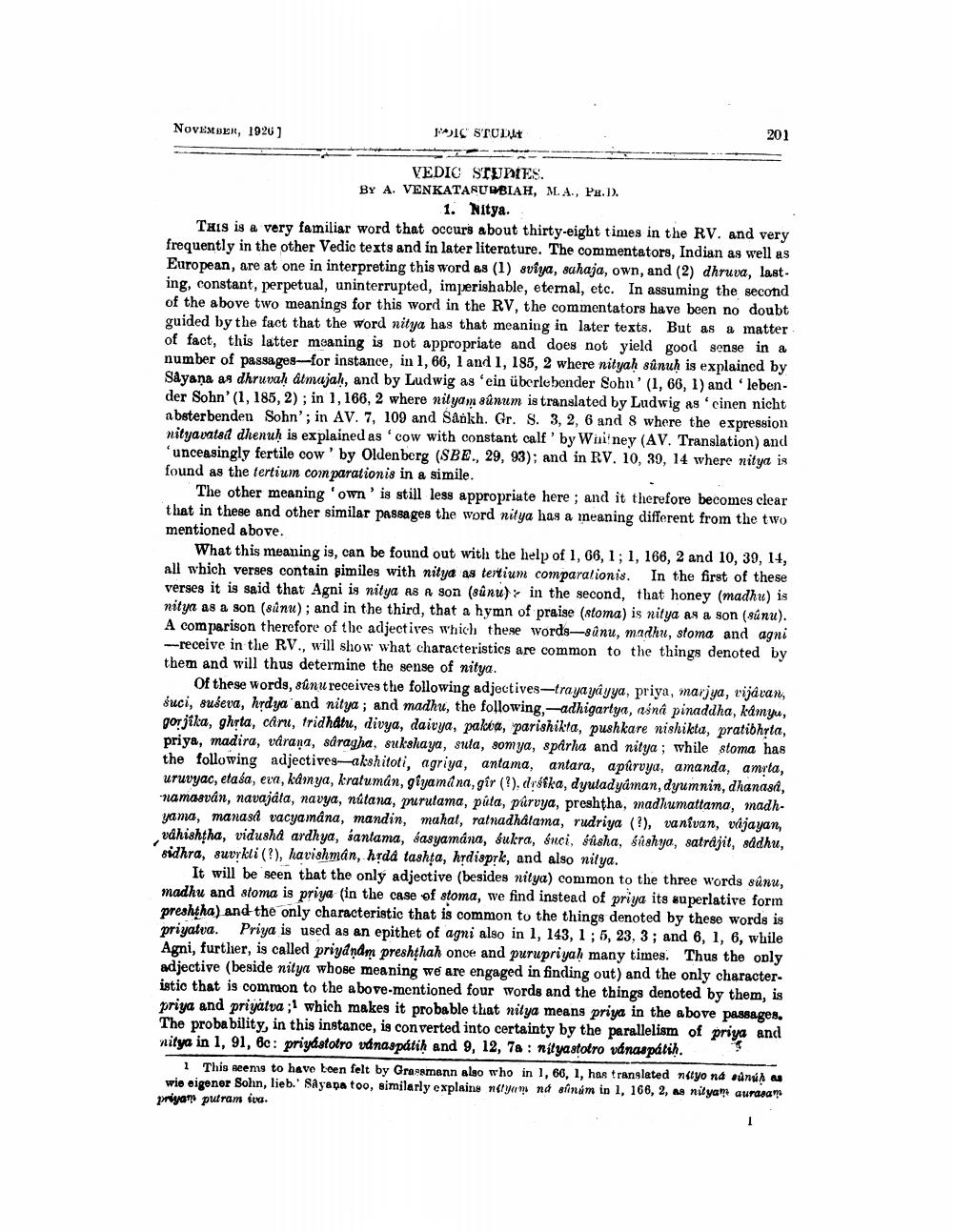________________
NOVEMBER, 1920)
1)IC STUDI
201
VEDIC STUDIES. BY A. VENKATASUBBIAH, MA., Ph.1).
1. Nitya This is a very familiar word that occurs about thirty-eight times in the RV. and very frequently in the other Vedic texts and in later literature. The commentators, Indian as well as European, are at one in interpreting this word as (1) sviya, sahaja, own, and (2) dhruva, lasting, constant, perpetual, uninterrupted, imperishable, eternal, etc. In assuming the second of the above two meanings for this word in the RV, the commentators have been no doubt guided by the fact that the word nitya has that meaning in later texts. But as a matter of fact, this latter meaning is not appropriate and does not yield good sense in a number of passages--for instance, in 1, 66, 1 and 1, 185, 2 where nityah sủnuh is explained by Sayana as dhruvah almajah, and by Ludwig as 'ein überlebender Sohn' (1, 66, 1) and 'lebender Sohn' (1,185, 2); in 1, 166, 2 where nityam sânum is translated by Ludwig as 'cinen nicht absterbenden Sohn'; in AV. 7, 109 and Sankh. Gr. S. 3, 2, 6 and 8 where the expression nityavatait dhenuh is explained as cow with constant calf' by Whitney (AV. Translation) and
unceasingly fertile cow' by Oldenberg (SBE., 29, 93); and in RV. 10, 39, 14 where nitya is found as the tertium comparationis in a simile.
The other meaning own' is still less appropriate here, and it therefore becomes clear that in these and other similar passages the word nitya has a meaning different from the two mentioned above.
What this meaning is, can be found out with the help of 1, 66, 1; 1, 166, 2 and 10, 30, 14, all which verses contain similes with nitya as tertium comparationis. In the first of these verses it is said that Agni is nitya As A son (sûnu) in the second, that honey (madhu) is nitya as a son (sinu); and in the third, that a hymn of praise (stoma) is nitya as a son (sūnu). A comparison therefore of the adjectives which these words-sûnu, madhu, stoma and agni --receive in the RV., will show what characteristics are common to the things denoted by them and will thus determine the sense of nitya.
Of these words, sūnu receives the following adjectives-trayayayya, priya, marjya, vijd van, suci, suševa, hrdya and nitya; and madhu, the following, -adhigartya, aina pinaddha, kamyu, gorjika, ghrta, cari, tridhatu, divya, daivya, pakoa, parishikta, pushkare nishikta, pratibhyta, priya, madira, vdrana, sdragha, sukshaya, suta, som ya, sparha and nitya; while stoma has the following adjectives—akshitoti, agriya, antama, antara, apirvya, amanda, amrta, uruvyac, etaša, era, kamya, kratumán, giyamana, gir (?), dréfka, dyuladyaman, dyumnin, dhanasi, namasván, navajata, navya, nútana, purutama, puta, pûrvya, preshtha, madhumattama, madhyama, manasd vacyamana, mandin, mahat, ratnadhatama, rudriya (?), vanivan, vájayan, váhishtha, vidushå ardhya, santama, kasyamana, tulera, śnci, súsha, sishya, satrajit, addhu, sidhra, suvrkli (?), havishman, hida tashta, hrdisprk, and also nitya.
It will be seen that the only adjective (besides nitya) common to the three words súnu, madhu and stoma is priya (in the case of stoma, we find instead of priya its superlative form preshtha) and the only characteristic that is common to the things denoted by these words is priyatva. Priya is used as an epithet of agni also in 1, 143, 1 ; 5, 23, 3; and 6, 1, 6, while Agni, further, is called priyandm preshthah once and purupriyah many times. Thus the only adjective (beside nitya whose meaning we are engaged in finding out) and the only characteristio that is common to the above-mentioned four words and the things denoted by them, is priya and priyatva ;1 which makes it probable that nitya means priya in the above passages, The probability, in this instance, is converted into certainty by the parallelism of priya and nitya in 1, 91, 8c: priydstotro vanaspatih and 9, 12, 78 : nityastotro vanaspatih.
1 This seems to have been felt by Grassmann also who in 1, 66, 1, has translated netyo na unus as wie eigener Sohn, lieb. Sayapa too, similarly explaine ney n d afinam in 1, 166, 2, a nityam aurasam priya putram iva.




